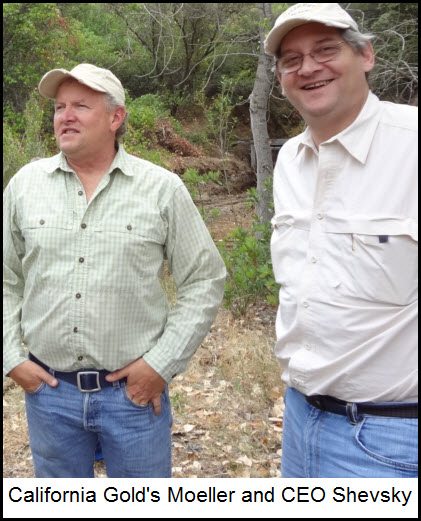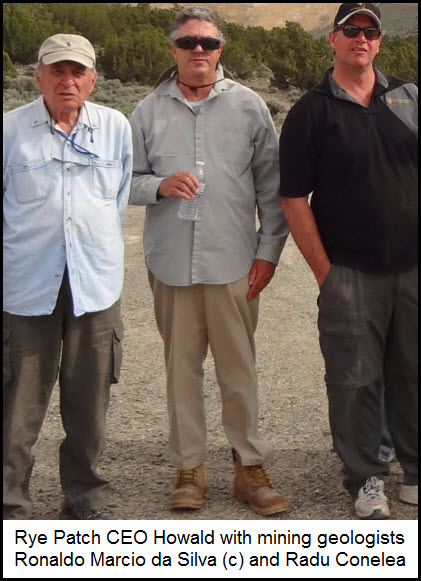With bullion prices on the upswing and a possible end to the bear market that has ravaged mining shares for nearly two years, it’s a good time to look at a pair of junior exploration companies whose properties we recently visited. The companies are Rye Patch Gold [RPMGF: OTC], with holdings totaling 65 square miles along the Oreana and Cortez trends in Nevada; and California Gold Mining Inc. [CGM: CN] , which owns the 3351-acre Fremont Property in Mariposa, at the southern tip of the Motherlode just outside the border of Yosemite National Park . Like most small exploration companies, their respective stocks are trading at bargain-basement levels that beggar belief. We would have no qualms about recommending either stock to family or friends. The caveat, however, is that neither stock is likely to move significantly higher if bullion quotes remain in a funk or fall.
First, Rye Patch. A visitor to sites the company has leased near Elko and Winnemucca is certain to be awed by their panoramic grandeur. With a sweep of the hand, CEO Bill Howald traces out a broad vista of hills and valleys outside of Elko that contain gold and silver ore that is Rye Patch’s for the taking. With so much land under the firm’s operational control, much of it contiguous with promising stakes held and mined by much bigger companies, it’s truly astounding, but also depressing, that one can buy a share of Rye Patch these days for just 17 cents. That price could just as easily go to $2 a share or more if investors were to return enthusiastically to the idea that gold itself is precious.
Alas, and for now at least, bullion mania seems a distant prospect. As such, our enthusiasm for the two companies is based on our strong confidence that the CEOs of these firms are capable of realizing full value for shareholders if and when bullion’s investment appeal returns in a big way. Meanwhile, they are both on solid enough financial ground and have costs well enough under control that even if the price of bullion were to languish, they look like good bets to survive.
An Astute Risk-Taker
Under Howald’s experienced leadership, Rye Patch has assembled a small team of geologists whose expertise goes as deep and wide as the company’s drill holes. Because they come from very different mining backgrounds – one is Rumanian; another, South American – they are given to disagree at times. However, with adroit guidance from Howald, a geologist himself who is considered an astute risk-taker, Rye Patch’s ability to meld consensus and to take profitable gambles is probably as good a speculative play on gold in the ground as investors could hope to find. Further confirmation of this awaits results at the company’s Garden Gate site. There Rye Patch has inferred from a relatively small number of bore holes that a rich but narrow vein of gold sits between two somewhat bulbous trends. If the company hits it big at Garden Gate, it would underscore their knack for finding significant quantities of ore in places where it takes just the right mix of art and science to find a rich vein.
It doesn’t hurt that Rye Patch just came into a $10 million windfall from a suit against Coeur d’Alene. Some of it will go toward more-extensive exploration of Garden Gate and other sites, and we should therefore expect the firm’s proven and inferred reserves to rise accordingly. Meanwhile, don’t be spooked by the fact that RPMGF’s price got cut in half last month when the settlement with Coeur d’Alene was announced by the Nevada Supreme Court. Some shareholders evidently were very disappointed that Rye Patch was forced to give back properties it had overstaked when Coeur forgot to pay some leasing fees. In our view, Rye Patch was a bargain then at 35 cents a share, but even moreso at their current price of around 17 cents. At Friday’s settlement price of 0.1650, Rye Patch’s 155 million fully diluted shares would give the company a valuation of about $25.6 million.
Permitting Is Key
As for California Gold Mining Inc., the company is aggressively pursuing opportunities in a state that has traditionally been hard on permitting. Spend a day with CGM’s chief operating officer Eric Moeller, however, and you begin to understand how diligently this company takes its responsibilities as a steward of the land. CGM has achieved an excellent rapport with the locals, which is essential because it is county agencies and not the federal government or the State of California that issues permits to miners.
 Although the Fremont Property that CGM acquired in March produced about 126,000 ounces of gold between 1848 and 1944, the firm is in no great rush to exploit well-documented (although not 43101-compliant) historic resources that could yield as much as two million more ounces. Instead, CGM has focused on permitting and on getting things precisely right at Fremont before it does any digging. It is not yet certain whether that will entail above-ground excavation or the sinking of mines, but the company is preparing for either and has been hammering out a plan with Mariposa County that will satisfy the jurisdiction’s environmental requirements as well its economic aspirations.
Although the Fremont Property that CGM acquired in March produced about 126,000 ounces of gold between 1848 and 1944, the firm is in no great rush to exploit well-documented (although not 43101-compliant) historic resources that could yield as much as two million more ounces. Instead, CGM has focused on permitting and on getting things precisely right at Fremont before it does any digging. It is not yet certain whether that will entail above-ground excavation or the sinking of mines, but the company is preparing for either and has been hammering out a plan with Mariposa County that will satisfy the jurisdiction’s environmental requirements as well its economic aspirations.
Financial Fitness
The firm’s CEO, Martin Shefsky, believes that all of the hard work will eventually pay off in a big way when CGM expands its operations in California. He sees exceptional opportunities in the state, in part because Sacramento is strapped for revenues and has warmed to mining companies in a way that few would have predicted just a few years ago. With a law degree from Pepperdine and impressive creds along the way in finance, Shevsky is the sort of mining executive who is concerned first of all about the financial fitness of the company he runs. That said, it should be noted that CGM, with a valuation of about $12 million, is very closely held, with 90% of the company in the hands of just eight shareholders. One of them who was on board for the tour, an entrepreneurial investor who has taken several companies public, said the $5 million that CGM paid for Fremont was so cheap that even in a “doomsday scenario” the value of CGM’s land for ranching and other non-mining purposes would fetch close to the company’s current $12 million valuation. With permitting as their major expense and the environmental impact studies already done, he said, CGM would still be in “great financial shape” three years from now even if there’s no pop in the price of gold.


http://www.rickackerman.com/2012/05/gold-penny-stock-worth-another-look/